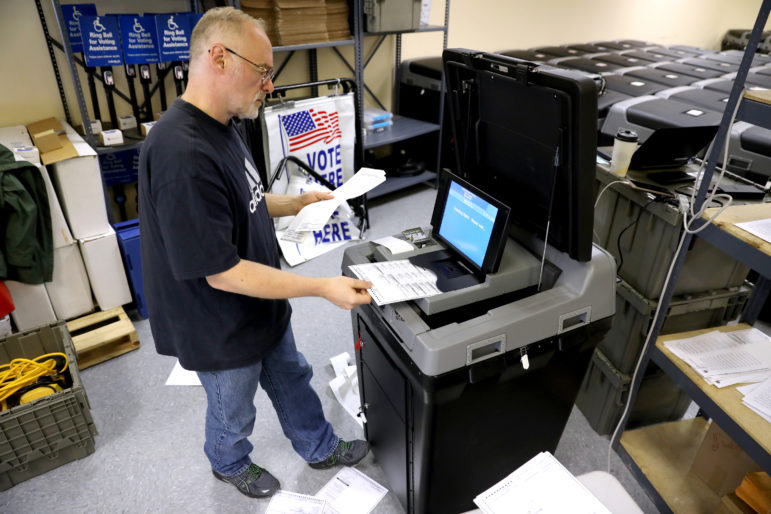Why State Voting Audit Was Remarkable
Largest hand recount in state history finds not one voting machine error, wins bipartisan praise.

Test of election equipment. File photo by Coburn Dukehart / Wisconsin Center for Investigative Journalism.
It was the most extensive hand recount of ballots in state history.
Local clerks checked 222,075 ballots – or about one out of every 12 – cast in the November 2022 election against totals their voting machines had recorded. Ordered by the Wisconsin Elections Commission (WEC), the audit came before the April 4 statewide vote that will decide whether conservatives or liberals control the state Supreme Court and before the 2024 election for President.
It was the first audit since former President Donald Trump and MAGAites insisted he had been cheated out of a second term by the 2020 vote in Wisconsin and three other states, only to lose 61 of 62 lawsuits making these claims.
It was released days before President Joe Biden underscored the importance of Wisconsin in the 2024 presidential election by visiting the state hours after his State of the Union speech. Biden also made the same Wisconsin pilgrimage – to Superior – after his 2022 speech.
The audit’s surprising conclusion: Not one mechanical error found in voting machines used by the 307 local governments ordered to hand-recount ballots.
The six partisan WEC commissioners, who often bitterly disagree, unanimously certified a voting machine error rate in Wisconsin of 0.0%.
By contrast, the federal government’s acceptable error rate is one out of every 500,000 ballots.
The audit found six minor errors not caused by voting machines – something Elections Commission member Ann Jacobs said is unavoidable when overworked local clerks and armies of volunteer poll workers must balance complicated rules and confused voters.
The audit’s official conclusion:
There was “no evidence that any voting equipment used in the 2022 general election in Wisconsin … changed votes from one candidate to another, incorrectly tabulated votes, or altered the outcome of any audited contest.
“There was no evidence of programming errors, unauthorized alterations or ‘hacking’ of voting equipment software, or malfunctions of voting equipment that altered the outcome of any races on the ballot.”
Republican and Democrat appointees on WEC finally agreed on something. “Remarkable,” said Robert Spindell, a Republican who Democratic legislators want replaced because of his praise for GOP efforts to reduce voter turnout by Milwaukee’s Black and Hispanic voters in the November election.
The audit “should give confidence to the people of Wisconsin that these machines worked properly,” Spindell gushed.
“We count votes accurately and fairly in the State of Wisconsin,” added Democrat appointee Mark Thomsen.
“It’s crystal clear the machines are functioning the way we want them to function, and are accurate,” added Jacobs, also a Democrat.
Given the audit’s importance, how was it conducted?
Federal law requires independent follow-up checks on vote totals recorded by voting machines. WEC Chair Don Millis, a Republican appointee, pushed for the most ballots ever to be reviewed in the wake of controversies over the 2020 presidential election. Totals for four races were rechecked – governor/lieutenant governor, attorney general, secretary of state and the local Assembly seat.
About 90% of Wisconsin voters use an optical scan system in which their marked paper ballots are fed into a tabulator. Other voters, including those with disabilities, vote on an electric screen and their paper ballot is then cast on the machine.
WEC required that the audit include hand recounts of ballots in Milwaukee, Madison and the next 20 largest municipalities. For example, recounted were 7,207 ballots cast in seven Madison wards; 1,133 ballots in eight Milwaukee wards; 2,698 ballots in City of Oconomowoc wards, and 980 ballots from two City of Waukesha wards. Also, 5,305 ballots were rechecked in 10 wards in the Village of McFarland in Dane County and 4,546 ballots were recounted in 14 Town of Hudson wards in St. Croix County.
The audit noted that poll workers had to deal with poorly marked ballots, determine whether a ballot had been recorded before or after a machine jammed and interpret voter intent.
For example, non-machine errors involved fold lines on absentee ballots, which are counted by hand, and a Town of Grand Chute ballot in Outagamie County marked with green ink that was not recorded.
Relying on local clerks and volunteer poll workers means there will never be “100% compliance,” Jacobs noted.
Local governments will be paid 42 cents for every ballot rechecked — “not a lot of money,” Millis added..
Steven Walters started covering the Capitol in 1988. Contact him at stevenscotwalters@gmail.com
The State of Politics
-
RNC Brings Fame to Gen Z Party Leader
 Jul 15th, 2024 by Steven Walters
Jul 15th, 2024 by Steven Walters
-
Wisconsin’s Republican Roots Run Deep
 Jul 8th, 2024 by Steven Walters
Jul 8th, 2024 by Steven Walters
-
Feuding Supreme Court Justices Need a Break
 Jul 1st, 2024 by Steven Walters
Jul 1st, 2024 by Steven Walters



















